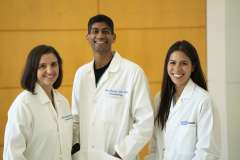Patient Success
Complex Care Team Delivers Results in Critical Situation
“It’s like an orchestra. Everyone’s playing differently, but if we’re not in harmony, it won’t work,” says Nirav Kamdar, MD, MPP, MBA, Director of Quality and a leader in our department’s innovation efforts. This “harmony” is exemplified by a recent collaboration among our Health System’s departments of neurosurgery, medicine, cardiology, and anesthesiology to deliver an optimal outcome in a complex case.
The patient, Russell Kingsley, suffered a fall which resulted in a fractured neck and spinal cord compression. When he arrived at UCLA’s Ronald Reagan Medical Center, he had already developed paralysis of both arms and one leg. Prompt surgery was critical to stabilize the fracture and prevent further damage, but treatment was complicated by his current blood-thinning medications, his underlying heart condition, and his compromised kidney function. After the patient’s initial evaluation, our department’s Complex Care Team (CCT) was contacted and quickly mobilized to facilitate a coordinated perioperative care plan.

Dr. Kamdar evaluated the patient at bedside. That afternoon, Lauren Beck, MD, our Perioperative Medicine Fellow, summarized the case’s complexities. Specialists from neurosurgery, nephrology, cardiology, and pain medicine provided consultation and agreed on how to adjust the patient’s many medications in view of the upcoming surgery. That evening, Barbara Van de Wiele, MD, our Director of Neurosurgical Anesthesiology, and Natalie Moreland, MD, Director of Anesthesia for Spine Surgery, reviewed the case further and refined the perioperative and intraoperative plan of care. The new plan was entered into Care Connect, UCLA’s electronic health record, including the new doses of the patient’s medications to minimize surgical and cardiac risk, and preparations for intraoperative dialysis if needed.
Mr. Kingsley had difficult decisions to make. His quality of life was dramatically impaired by the extent of his injuries, but could be even worse if surgery led to any of the many possible complications. How did he come to a quick decision to move forward with the high-risk operation?
“It was clear that they did their homework,” says Mr. Kingsley. “They were perfectionists, and they put their heads together. I was totally comfortable with the whole team.” He said the team didn’t sugar-coat the risks; he was encouraged to get his affairs in order. Ultimately, though, Mr. Kingsley hoped for a better quality of life than he could have without surgery.
Thanks to the team effort and meticulous planning, the complex 6-hour operation unfolded like “a routine appendectomy,” says Dr. Kamdar. Within one hour of extubation, the patient had full movement of his arms and legs and was texting the good news to his friends and family.
“Post-surgical texting is always a good sign!” says Dr. Kamdar.
The speed and success of this collaboration is a result of years of focused attention on our perioperative care redesign. It illuminates how far the profession of anesthesiology has moved beyond the walls of the operating room to deliver all-encompassing perioperative care — as reflected in the name change of our department to become the UCLA Department of Anesthesiology and Perioperative Medicine. In 2015, Maxime Cannesson, MD, PhD, an internationally known anesthesiologist and researcher in areas as diverse as enhanced recovery and machine-learning, was recruited to serve as our Vice Chair for Perioperative Medicine. Today, the scope of our perioperative care extends into the intensive care units and even beyond the hospital, with broad expansion of our community pain medicine clinics and the use of telemedicine to augment the reach of our Preoperative Evaluation and Planning Clinic (PEPC).
And how is Mr. Kingsley doing after surgery?
While still in the PACU, he said, ”I feel like a million bucks. I’d race out of here, if I could. I thought I’d have some irreversible damage, but it’s like I never had anything wrong. I’m forever grateful. I’m overwhelmed by this staff, this hospital, and their care and concern.”
By Claire Winters